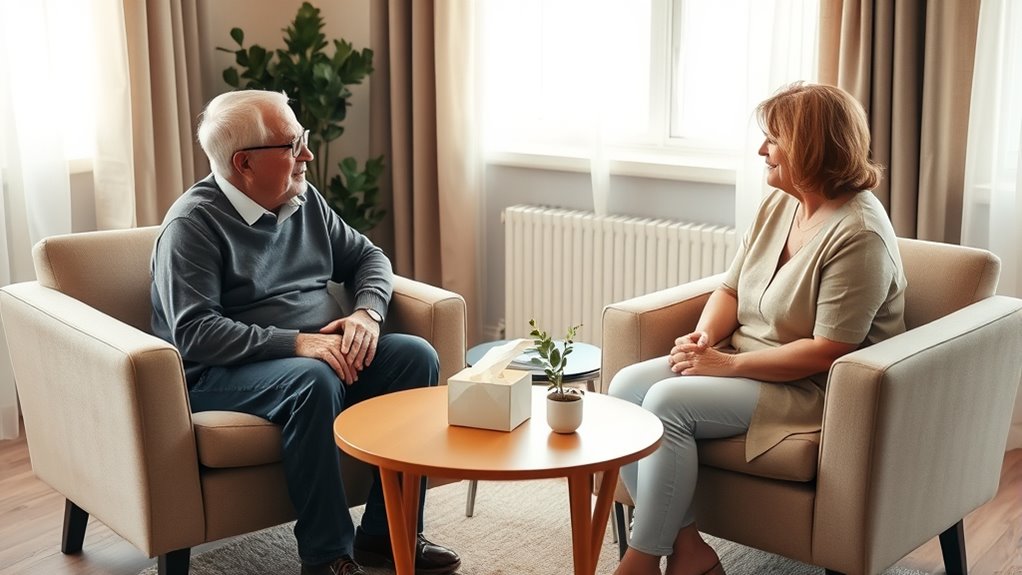Couples therapy for infidelity helps you and your partner rebuild trust, improve emotional honesty, and address underlying issues affecting your relationship. A therapist provides a safe space for open communication, guiding you through honesty, patience, and transparency. By exploring root causes and practicing new ways to connect, you can heal and grow stronger together. Continuing to explore these approaches can give you the tools needed to restore your relationship and move forward confidently.
Key Takeaways
- Couples therapy provides a safe environment for emotional honesty, enabling partners to openly share feelings, fears, and questions about infidelity.
- Professional guidance helps rebuild trust gradually through consistent honesty, transparency, and establishing a foundation of reliability.
- Therapy explores underlying relationship issues and root causes of infidelity to promote healthier communication and prevent future problems.
- Creative techniques and a calming environment facilitate open dialogue, emotional connection, and active listening between partners.
- The process supports lasting healing, emphasizing commitment, transparency, and rebuilding trust, often strengthening the relationship long-term.

Have you ever wondered if couples therapy can help heal a relationship after infidelity? The answer is often yes, but it depends on your willingness to engage in the process. One of the most essential aspects of therapy in these situations is trust rebuilding. When trust has been shattered by betrayal, it can feel nearly impossible to imagine a way back. Therapy provides a safe space where both partners can work through the pain, fears, and doubts that come with infidelity. Your therapist will guide you through steps to gradually restore trust, which involves consistent honesty, patience, and transparency. Trust isn’t rebuilt overnight, but with professional help, you learn to create a foundation of reliability again.
Alongside trust rebuilding, emotional honesty is a fundamental component of therapy for couples facing infidelity. You need to be open about your feelings, questions, and fears, even if it’s uncomfortable. Emotional honesty means sharing your inner experience without judgment or defensiveness, which can be challenging after betrayal. Your therapist encourages you both to express yourselves authentically and listen without interruptions or dismissiveness. This process helps break down barriers of suspicion and denial, fostering a deeper understanding of each other’s emotional states. When you’re honest about your feelings—whether it’s guilt, anger, sadness, or confusion—you create a bridge to empathy and connection. Additionally, understanding how home theatre projectors can influence the environment may help create a calming space conducive to open dialogue.
Couples therapy also helps you recognize and address the underlying issues that may have contributed to the infidelity. It’s not just about fixing the breach but understanding the dynamics that allowed it to happen. It is essential to explore the root causes of the issues to prevent future problems and promote lasting healing. Exploring legal divorce options or other relationship concerns during therapy can sometimes reveal additional insights into your relationship’s health. As you work through these issues, emotional honesty becomes even more essential. It allows you to confront uncomfortable truths and work together to develop healthier patterns of communication and behavior. Your therapist acts as a neutral guide, helping you stay focused and compassionate during difficult conversations. Incorporating the concept that creative practice can also foster emotional healing might be helpful, as engaging in shared activities promotes connection. With consistent effort, you’ll find that emotional honesty becomes easier, and trust begins to rebuild on a more genuine and resilient level. Engaging in effective communication techniques can significantly enhance this process.
Ultimately, couples therapy isn’t a magic fix, but it provides the tools and environment necessary for healing. Trust rebuilding and emotional honesty are the cornerstones of this process. By committing to transparency and openness, you and your partner can navigate the challenging path toward reconciliation. With professional guidance, many couples discover that not only can they repair their relationship, but they can also emerge stronger and more connected than before.
Frequently Asked Questions
How Long Does Couples Therapy Typically Last for Infidelity?
The therapy duration for infidelity varies, depending on your specific situation and healing timeline. Typically, you might attend sessions weekly or biweekly for several months, often lasting around 3 to 6 months. Some couples may need longer, especially if trust has been deeply broken. Remember, consistent effort and open communication are key to progress, and your therapist will tailor the process to support your unique journey toward healing.
Can Couples Therapy Fully Repair Trust After Betrayal?
Like planting a seed that grows into a sturdy tree, couples therapy can foster emotional rebuilding and trust restoration after betrayal. While it offers valuable tools and guidance, fully repairing trust depends on your commitment and honesty. You might not forget the hurt, but with patience and professional help, you can rebuild a stronger, more resilient relationship. It’s a journey, and therapy helps you navigate toward healing together.
Are There Specific Therapy Approaches Best for Infidelity Issues?
You might wonder if certain therapy approaches work best for infidelity issues. The truth is, methods like Emotionally Focused Therapy (EFT) and the Gottman Method focus on emotional healing and improving communication skills. These approaches help both partners express feelings, rebuild trust, and understand each other better. Choosing a therapist skilled in these techniques can guide you through healing, making recovery more effective and helping you move forward together.
Is Individual Therapy Recommended Alongside Couples Therapy?
Is it beneficial to pursue individual therapy alongside couples therapy? Absolutely. While couples therapy helps rebuild trust, individual sessions bolster your emotional resilience and aid boundary setting. This dual approach allows you to explore personal feelings, address underlying issues, and develop coping skills. Do you want to heal fully and grow stronger? Combining both therapies offers a thorough path to recovery, giving you the tools to navigate the healing process effectively.
What Should I Do if My Partner Is Unwilling to Attend Therapy?
If your partner’s unwilling to attend therapy, focus on fostering mutual accountability and understanding their emotional readiness. You can encourage open conversations about healing and growth, showing empathy and patience. Demonstrate your commitment to the relationship’s future, which might inspire them to join you later. Remember, healing begins with your own efforts, and respecting their pace can sometimes open the door for eventual participation in therapy together.
Conclusion
Research shows that couples who seek therapy after infidelity are 70% more likely to rebuild trust and move forward together. By embracing professional guidance, you can navigate the complex emotions and uncover underlying issues. Remember, healing takes time, but with commitment and the right support, rebuilding your relationship is possible. Don’t shy away from seeking help—your journey toward recovery can lead to a stronger, more honest partnership.









